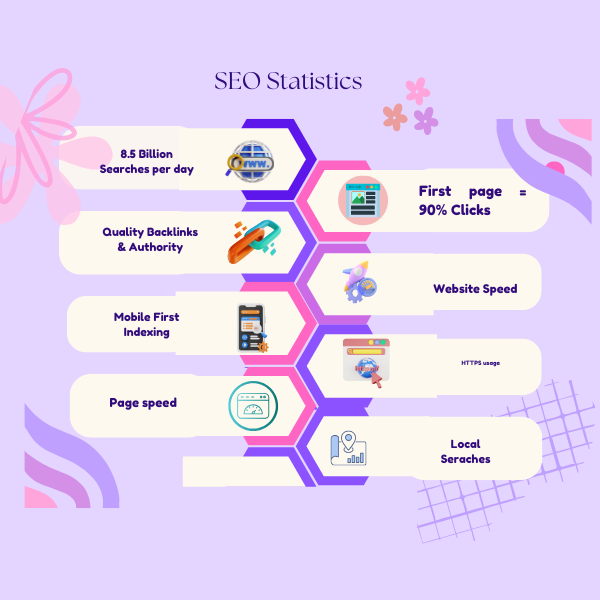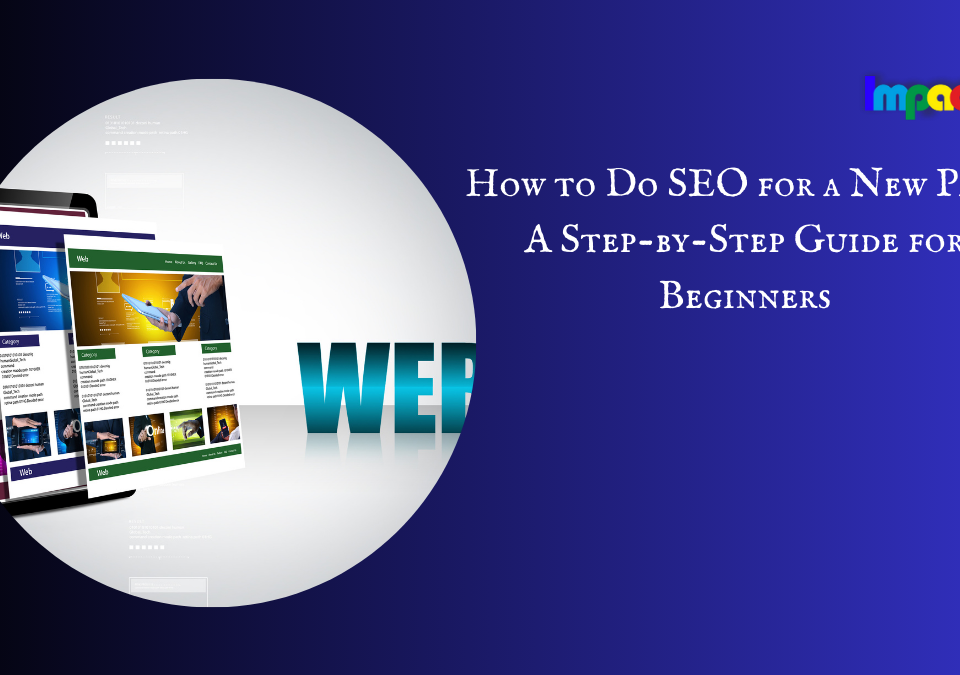Search engine optimization (SEO) is the process of improving the visibility and relevance of a website or web page in the organic search results of search engines like Google, Bing, and others. SEO is essential for any online business that wants to attract more traffic, leads, and customers from the web.
SEO is not a one-time activity, but an ongoing process that requires constant monitoring, analysis, and adjustment. SEO is also not a static set of rules, but a dynamic and evolving field that changes with the updates and innovations of search engines and user behavior.
In this guide, we will cover the basics of complete SEO for beginners who want to start or improve their SEO efforts in 2024. We will explain what SEO is, why it matters, how it works, and what are the best practices and trends to follow. We will also provide some useful tools and resources to help you along the way.

Table of Contents
What is SEO and why does it matter?
SEO stands for search engine optimization, which is the process of improving the visibility and relevance of a website or web page in the organic search results of search engines like Google, Bing, and others.
Organic search results are the listings that appear below the paid ads on a search engine results page (SERP). They are also known as natural or unpaid results. Organic results are ranked by search engines based on various factors, such as relevance, quality, authority, popularity, and user experience.
SEO matters because organic search is one of the most important sources of traffic for websites. According to a study by BrightEdge, organic search accounted for 53% of all website traffic in 2020. Organic search is also more likely to generate high-quality leads and conversions than other channels, as users who search for something are usually more interested and ready to take action.
Complete SEO can help you achieve various goals for your online business, such as:
- Increasing your brand awareness and credibility
- Driving more qualified traffic to your website
- Generating more leads and sales
- Enhancing your user experience and satisfaction
- Reducing your marketing costs and increasing your ROI
How does SEO work?
SEO works by optimizing your website and web pages for both search engines and users. The ultimate goal of SEO is to match your content with the intent and needs of your target audience.
To understand how SEO works, you need to know how search engines work. Search engines have three main functions: crawling, indexing, and ranking.
Crawling
Crawling is the process of discovering new or updated web pages on the internet. Search engines use automated programs called crawlers or spiders to scan the web and follow links from one page to another. Crawlers collect information about each page they visit, such as its content, structure, metadata, links, images, etc.
Indexing
Indexing is the process of storing and organizing the information collected by crawlers in a huge database called the index. The index is like a library of web pages that search engines can access and retrieve when needed. Indexing involves analyzing the content and meaning of each page and assigning it to relevant keywords or topics.
Ranking
Ranking is the process of ordering and displaying the indexed web pages on a SERP according to their relevance and quality for a given search query. Ranking involves applying complex algorithms that consider hundreds of factors or signals to determine which pages are the best matches for what users are looking for. Some of the most important ranking factors are:
- Content quality and relevance: The content of your web page should be original, informative, engaging, and relevant to the search query. It should also satisfy the user intent, which is the goal or purpose behind the query.
- Keyword optimization: Keywords are the words or phrases that users type into search engines to find what they need. You should optimize your content for the keywords that your target audience uses to search for your products or services. You should also use related keywords or synonyms to cover different variations and nuances of user queries.
- Site structure and navigation: Your website should have a clear and logical structure that makes it easy for both users and crawlers to find and access your content. You should also have a user-friendly navigation system that helps users explore your site and find what they need.
- Mobile-friendliness: Your website should be responsive and adaptable to different devices and screen sizes, especially mobile devices. Mobile-friendliness is crucial for SEO as more than half of all web traffic comes from mobile devices. Moreover, Google uses mobile-first indexing, which means it prioritizes the mobile version of your site over the desktop version when crawling and indexing.
- Page speed: Your website should load fast on all devices and browsers. Page speed is important for SEO as it affects both user experience and ranking. Users tend to abandon slow-loading pages and bounce back to SERPs, which signals to search engines that your page is not relevant or satisfying. Google also considers page speed as a ranking factor, especially for mobile searches.
- Technical SEO: Technical SEO refers to the optimization of the technical aspects of your website that affect its performance and crawlability. Technical SEO includes aspects such as HTTPS, XML sitemaps, robots.txt, canonical tags, schema markup, and more. Technical SEO helps search engines understand, index, and rank your site better.
- Link building: Link building is the process of acquiring links from other websites to your own website. Links are like votes of confidence or recommendations that indicate the popularity and authority of your site. Search engines use links as a ranking factor, as they imply that your site has valuable and trustworthy content. However, not all links are equal. You should aim for quality over quantity, and focus on getting links from relevant and reputable sites in your niche.
- User signals: User signals are the behavioral patterns and feedback of users on your website and web pages. User signals include metrics such as click-through rate (CTR), bounce rate, dwell time, pages per session, and more. User signals help search engines measure the quality and relevance of your content and user satisfaction. You should optimize your site for user signals by providing a positive and engaging user experience.
What are the best practices and trends for SEO in 2024?
SEO is a dynamic and evolving field that changes with the updates and innovations of search engines and user behavior. To stay ahead of the curve and achieve SEO success in 2024, you need to follow the best practices and trends that will shape the SEO landscape in the near future. Some of the most important ones are:
AI and machine learning
AI and machine learning are transforming the SEO landscape by making search engines smarter and more human-like. Search engines can now understand the context, meaning, and intent behind user queries better than ever, thanks to AI-powered algorithms like Google’s BERT and MUM. These algorithms can analyze natural language, complex sentences, and multimodal inputs (such as images, videos, or audio) to provide more relevant and accurate results.
AI and machine learning also enable search engines to personalize search results based on user preferences, behavior, location, device, and more. This means that different users may see different results for the same query, depending on their search history, interests, demographics, etc.
AI and machine learning also offer new opportunities for SEO practitioners to leverage AI-powered tools for content creation, optimization, keyword research, link building, analytics, and more. These tools can help automate tedious tasks, generate high-quality content, discover new insights, and enhance SEO performance.
Voice search
Voice search is becoming more popular and prevalent as more users rely on voice assistants like Google Assistant, Siri, Alexa, Cortana, etc., to perform various tasks and searches on their devices. According to a report by Juniper Research, voice-based ad revenue could reach $19 billion by 2022. Voice search is also expected to account for 50% of all searches by 2024.
Voice search optimization is essential for SEO as voice queries are different from text queries in terms of length, structure, tone, and intent. Voice queries are usually longer, more conversational, more question-based, and more local-oriented than text queries. For example:
- Text query: “best pizza near me”
- Voice query: “Hey Google, where can I get the best pizza near me?”
To optimize your site for voice search, you should:
- Use natural language and long-tail keywords that match how people speak
- Optimize for question phrases that start with who, what, where, when, why, how
- Provide clear and concise answers to common questions
- Use schema markup to add structured data to your site
- Optimize for local SEO by claiming your Google My Business listing
- Ensure your site is mobile-friendly and fast-loading
Video SEO
Video content is no longer the future – it’s the present. With platforms like YouTube, TikTok, Instagram Reels, and more gaining immense popularity, video content is increasingly becoming the preferred medium for many. These platforms have created a new form of content consumption, where users expect information to be delivered quickly, engagingly, and visually.
As more users consume information through videos, ensuring your content is optimized for search is essential. This involves proper keyword research for video titles, descriptions, and transcriptions. You should also use tags, thumbnails, and captions to make your videos more appealing and accessible. Moreover, you should leverage schema markup to add video snippets to your web pages, which can increase your CTR and visibility on SERPs.
User experience (UX)
User experience (UX) is the overall impression and satisfaction that users have when interacting with your website or web page. UX is crucial for SEO as it affects both user behavior and ranking. Users tend to stay longer on sites that provide a positive and engaging UX, and bounce back from sites that provide a negative or frustrating UX.
Search engines also use UX as a ranking factor, as they aim to provide the best results for their users. Google has introduced various UX-related metrics and signals, such as Core Web Vitals, Page Experience, and E-A-T (Expertise, Authoritativeness, and Trustworthiness), to measure and evaluate the quality and usability of web pages.
To optimize your site for UX, you should:
- Improve your site speed and performance
- Enhance your site design and layout
- Optimize your site for mobile devices
- Use clear and intuitive navigation and menus
- Provide relevant and engaging content
- Use multimedia and interactive elements
- Reduce pop-ups and intrusive ads
- Ensure your site is secure and trustworthy
Content marketing
Content marketing is the creation and distribution of valuable, relevant, and consistent content to attract and retain a clearly defined audience and ultimately drive profitable customer action. Content marketing is the backbone of SEO, as it helps you provide useful information, solve problems, answer questions, and entertain your target audience.
Content marketing also helps you build authority, credibility, and trust in your niche, which can improve your ranking and reputation. Moreover, content marketing can help you generate more traffic, leads, and conversions, as well as increase your brand awareness and loyalty.
To optimize your site for content marketing, you should:
- Conduct thorough keyword research and competitor analysis
- Create a content strategy and editorial calendar
- Produce high-quality, original, and relevant content
- Optimize your content for SEO best practices
- Use various types of content, such as blog posts, articles, ebooks, infographics, videos, podcasts, etc.
- Promote your content on social media, email, and other channels
- Measure and analyze your content performance and ROI
What are some useful tools and resources for SEO?
SEO is a complex and multifaceted discipline that requires various tools and resources to execute effectively. Some of the most useful tools and resources for SEO are:
Tools
- Google Analytics: Google Analytics is a free web analytics tool that helps you measure and analyze your website traffic, behavior, conversions, and more. Google Analytics can help you understand your audience, optimize your site performance, and improve your SEO strategy.
- Google Search Console: Google Search Console is a free webmaster tool that helps you monitor and improve your site’s presence on Google search. Google Search Console can help you submit your sitemap, check your index status, fix crawl errors, optimize your site speed, test your mobile-friendliness, and more.
- Bing Webmaster Tools: Bing Webmaster Tools is a free webmaster tool that helps you monitor and improve your site’s presence on Bing search. Bing Webmaster Tools can help you submit your sitemap, check your index status, fix crawl errors, optimize your site speed, test your mobile-friendliness, and more.
- Ahrefs: Ahrefs is a paid SEO tool that helps you research keywords, analyze competitors, audit your site, monitor backlinks, and more. Ahrefs can help you discover new opportunities, identify gaps, and enhance your SEO performance.
- Moz: Moz is a paid SEO tool that helps you research keywords, analyze competitors, audit your site, monitor backlinks, and more. Moz can help you improve your ranking, visibility, and authority in your niche.
- SEMrush: SEMrush is a paid SEO tool that helps you research keywords, analyze competitors, audit your site, monitor backlinks, and more. SEMrush can help you optimize your content, strategy, and campaigns for SEO success.
- Mangools: Mangools is a powerful and affordable suite of SEO tools that helps you improve your website’s rankings and visibility in search engines. With Mangools, you can Find the right keywords, Track your rankings, Analyze your backlinks, Analyze your competitors. Mangools is the perfect SEO tool for anyone who wants to improve their website’s SEO. It’s easy to use, affordable, and packed with powerful features.
Resources
- Google’s SEO Starter Guide: This is a comprehensive guide by Google that covers the basics of SEO, such as how to make your site crawlable, indexable, and rankable by search engines. It also provides tips and best practices for improving your site’s quality, speed, and user experience.
- Moz’s Beginner’s Guide to SEO: This is an in-depth guide by Moz that covers the fundamentals of SEO, such as how search engines work, how to conduct keyword research, how to optimize your site for on-page and off-page factors, how to measure and track your SEO results, and more.
- Ahrefs’ Blog: This is a blog by Ahrefs that provides valuable insights, tips, and tutorials on various aspects of SEO, such as keyword research, content marketing, link building, technical SEO, and more. It also features case studies, experiments, and industry news that can help you stay updated on the latest trends and developments in SEO.
- Moz’s Blog: This is a blog by Moz that provides valuable insights, tips, and tutorials on various aspects of SEO, such as keyword research, content marketing, link building, technical SEO, and more. It also features case studies, experiments, and industry news that can help you stay updated on the latest trends and developments in SEO.
- SEMrush’s Blog: This is a blog by SEMrush that provides valuable insights, tips, and tutorials on various aspects of SEO, such as keyword research, content marketing, link building, technical SEO, and more. It also features case studies, experiments, and industry news that can help you stay updated on the latest trends and developments in SEO.
Conclusion
SEO is a vital component of any online business that wants to succeed in the digital world. SEO can help you increase your visibility, relevance, and authority on search engines, and attract more traffic, leads, and customers to your website.
SEO is not a one-time activity, but an ongoing process that requires constant monitoring, analysis, and adjustment. SEO is also not a static set of rules, but a dynamic and evolving field that changes with the updates and innovations of search engines and user behavior.
To achieve SEO success in 2024, you need to follow the best practices and trends that will shape the SEO landscape in the near future. You also need to use various tools and resources to help you execute your SEO strategy effectively.
We hope this guide has helped you understand the basics of SEO for beginners and inspired you to start or improve your SEO efforts in 2024. If you have any questions or feedback, please feel free to contact us. We are always happy to help.




